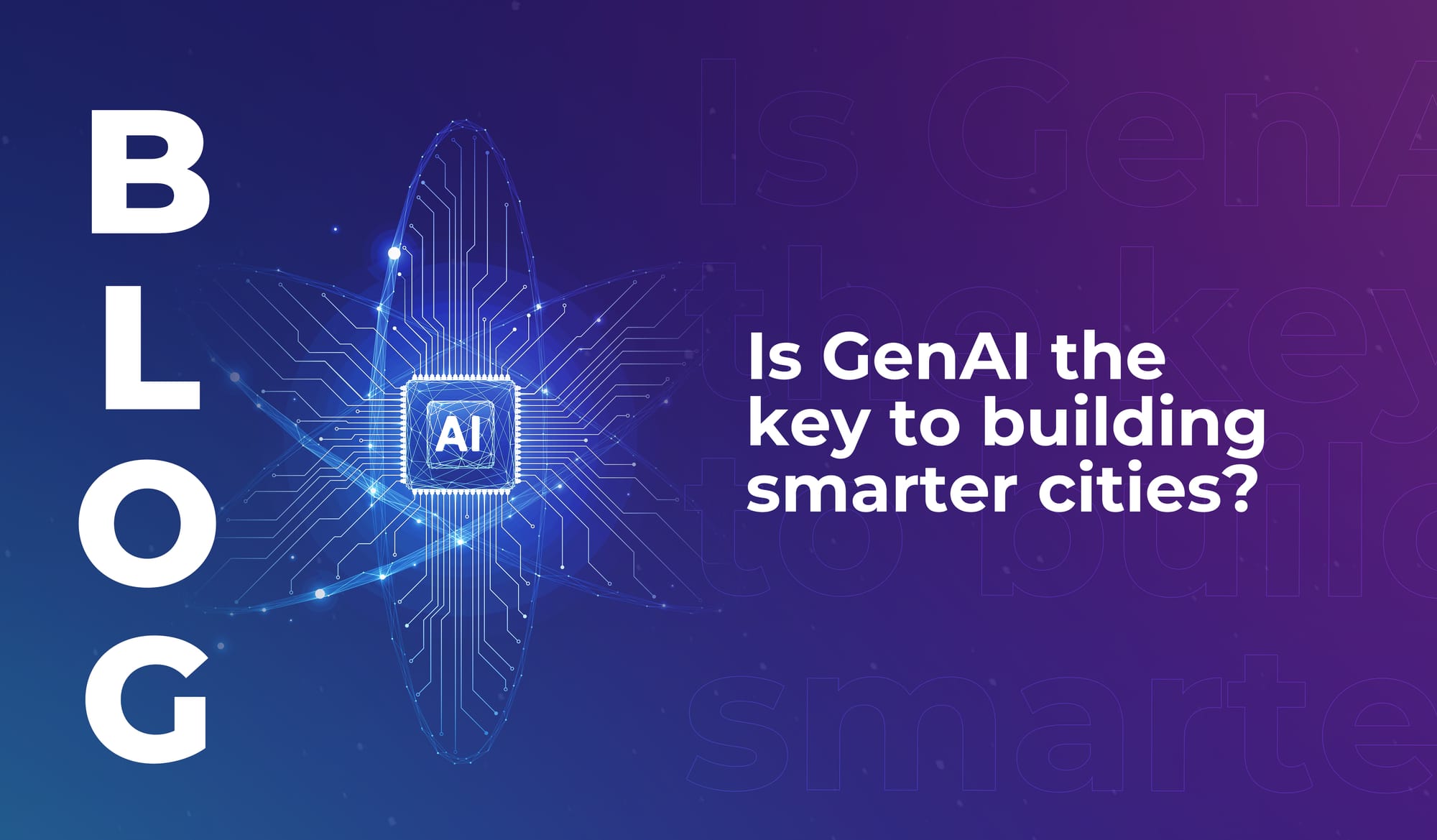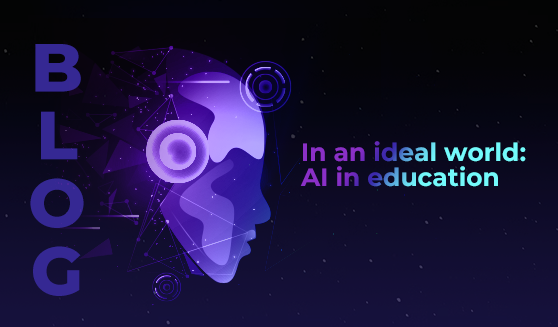
Is GenAI the key to building smarter cities?
Learn how generative AI is unlocking the true potential of digital twins – to make smart cities more efficient, inclusive, and citizen-focused.


Before he arrived in Riyadh for LEAP 2024, we caught up with Dr. Lin Zhou (SVP and Chief Information Officer at The New School).
Zhou joined The New School in 2019, following 20 years at IBM – where he was program director and innovation leader for Watson Education, leading it from startup phase to global leader in the application of AI in education.
We asked him what the impact of AI could be in an ideal world where nothing went wrong; and what the key challenges are to successfully (and positively) implementing AI tools and skills in educational settings.
“Over the course of my two-decade-long career, technology in education has undergone a transformative journey, evolving through three distinct levels. Initially, education embraced technology as a tool (TAAT), primarily focusing on imparting knowledge of how to utilise technological devices. This phase involved teaching students the mechanics of technology such as calculators or introducing students to programming languages like C++.
“As computational power surged and digital devices became more ubiquitous, education transitioned to the next level – technology as an assistant (TaaA). Here, technology began actively participating in the educational process, exemplified by the implementation of learning management systems (LMS) to facilitate asynchronous learning.
“However, the most remarkable shift occurred with the emergence of level three – technology as a partner (TaaP), and the evolution of AI technology, particularly highlighted by the GenAI boom in 2021.
“With this new shift, we witnessed a new era where technology not only assists but actively augments teaching and learning experiences. Key examples of this include AI-enabled tutoring services and responsive chatbots providing personalised guidance to students.
“Looking ahead, the trajectory of technology in education promises to deepen and broaden its integration into every facet of our educational endeavours. As educators, learners, and innovators, we stand at the threshold of a future where technology collaborates with us, enriching our educational landscape and empowering us to achieve new heights of excellence.”
“In considering the implementation of emerging technologies within the education sector to amplify student learning, it is imperative to first delineate our desired outcomes. Institutions must align their technological priorities with the overarching goal of equipping students for a dynamic and multifaceted future, fostering both their academic prowess and character development.
“One cannot overstate the transformative potential of emerging technologies like GenAI, heralding the advent of the fifth industrial revolution. These innovations render the integration of technology into classroom and lab environments indispensable. By embracing these advancements, educational institutions can empower students with the technical acumen necessary to thrive in an increasingly digitised world.
“Moreover, emerging technologies offer unparalleled opportunities for personalised learning experiences. Through the utilisation of digital education platforms bolstered by comprehensive data analytics, educators can tailor educational and career pathways to suit the unique strengths and aspirations of individual students. This tailored approach not only enhances academic achievement but cultivates a sense of agency and purpose as students navigate their educational journey.
“And the impact of emerging technologies extends beyond the confines of traditional pedagogy, redefining the very nature of interpersonal connections within educational settings. These technologies facilitate synchronous and asynchronous communication, transcending geographical barriers and temporal constraints. By fostering digital and physical interactions, educators can nurture the development of well-rounded individuals capable of thriving in a globally interconnected society.
“In essence, the integration of emerging technologies into the education sector represents a paradigm shift, offering boundless opportunities to reimagine and enhance the learning experience. By prioritising the adoption of these technologies, educational institutions can empower students to become agile thinkers, lifelong learners, and compassionate leaders poised to shape the future.”
“The integration of AI is vividly demonstrated by the unprecedented adoption rate of ChatGPT. While it took telephone companies 75 years to reach 100 million customers, OpenAI accomplished this same customer reach in just two months.
“This staggering 450x achievement underscores AI's profound impact, accelerating accessibility to information and advancing creativity across linguistic, disciplinary, and geographical boundaries. In an ideal world, AI stands as a potent force for democratising education, empowering students with unparalleled access to resources and tools.
“AI holds the promise of revolutionising the learning experience, enabling students to harness vast repositories of data and cutting-edge technologies to augment their educational journey. Within higher education institutions, we witness tangible examples of AI's transformative potential in action.
“For instance, students leverage GenAI applications for a myriad of items ranging from email correspondence and presentations to brainstorming sessions and automating repetitive tasks. Through automation, AI liberates valuable cognitive resources, for more meaningful and intellectually stimulating pursuits.
“Moreover, AI promotes a culture of cross-disciplinary collaboration, breaking down silos between academic disciplines and facilitating holistic learning experiences. Through AI-driven platforms, students from diverse backgrounds can engage in collaborative projects, drawing upon their unique perspectives and expertise to tackle complex challenges. By transcending traditional disciplinary boundaries, AI empowers students to cultivate a comprehensive understanding of real-world problems and develop innovative solutions that span multiple domains.
“In this ideal educational landscape, AI serves as an indispensable ally, guiding students on their quest for knowledge and equipping them with the tools and skills needed to thrive in an ever-evolving world. By democratising access to education and fostering collaboration, AI paves the way for a future where every student has the opportunity to realise their full potential and contribute meaningfully to society.
“As we embrace the transformative power of AI, let us seize this moment to reimagine education as a truly inclusive and empowering endeavour, where every learner has the opportunity to excel and succeed.”
“Water has the dual ability to both ferry a boat, as well as sink it. Much like water, AI holds the potential of being a transformer or peril. As we navigate the integration of AI into our education system, it's imperative to approach this transformation with both optimism and caution. We must recognize the dual nature of AI—its ability to advance society while also presenting challenges and dangers to human welfare.
“In embracing AI within education, it becomes paramount to adopt a comprehensive approach. This entails establishing robust governance frameworks that enable us to harness the benefits of AI while concurrently prioritising the protection of societal well-being. By doing so, we can ensure that AI becomes a force for positive change, empowering learners and educators alike to thrive in an increasingly digital age.”
“Participating in numerous international conferences over the years has been a cornerstone of my professional journey. With each event, I seek not only to contribute as a speaker, panellist, or organiser but to also immerse myself in an engaged and enriching experience. These gatherings serve as fertile grounds for networking, building partnerships, and amplifying our institution's global outreach efforts.
“Among the scores of conferences, LEAP stands out prominently as a beacon of innovation and collaboration. Its significance transcends regional boundaries, capturing the attention of the Middle East and the global stage alike. As I eagerly anticipate my participation, I am energised by the prospect of reuniting with familiar faces, forging new connections, and embarking on ventures that push the boundaries of possibility.
“These gatherings also play a pivotal role in elevating The New School’s global presence. Through active participation and engagement, we amplify our voice on the international stage, positioning ourselves as thought leaders and catalysts for positive change. By leveraging LEAP’s platform, we can amplify our impact and drive transformative initiatives that resonate far beyond the confines of a conference hall.”
Thanks to Dr. Lin Zhou at The New School. Did you miss LEAP 2024? Pre-register now for LEAP 2025 to secure your spot.

Learn how generative AI is unlocking the true potential of digital twins – to make smart cities more efficient, inclusive, and citizen-focused.

The smart cities of the future will use tech to lower emissions, cut urban temperatures, and improve quality of life in highly populated areas.

Discover the cities that rank highly for smart city preparedness, and learn why locally relevant innovation is more important than cutting-edge tech.

Learn how generative AI is unlocking the true potential of digital twins – to make smart cities more efficient, inclusive, and citizen-focused.

The smart cities of the future will use tech to lower emissions, cut urban temperatures, and improve quality of life in highly populated areas.

Discover the cities that rank highly for smart city preparedness, and learn why locally relevant innovation is more important than cutting-edge tech.